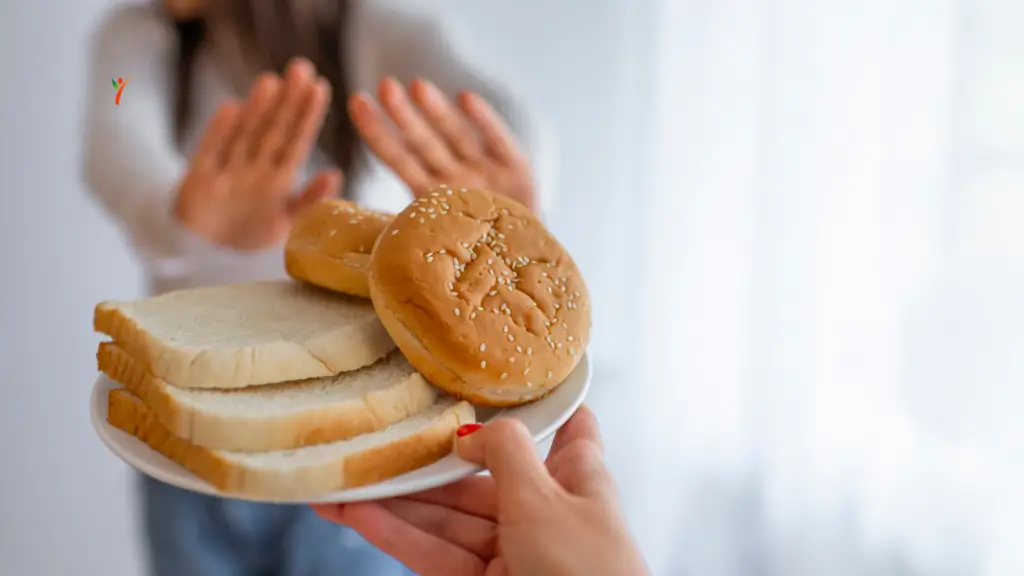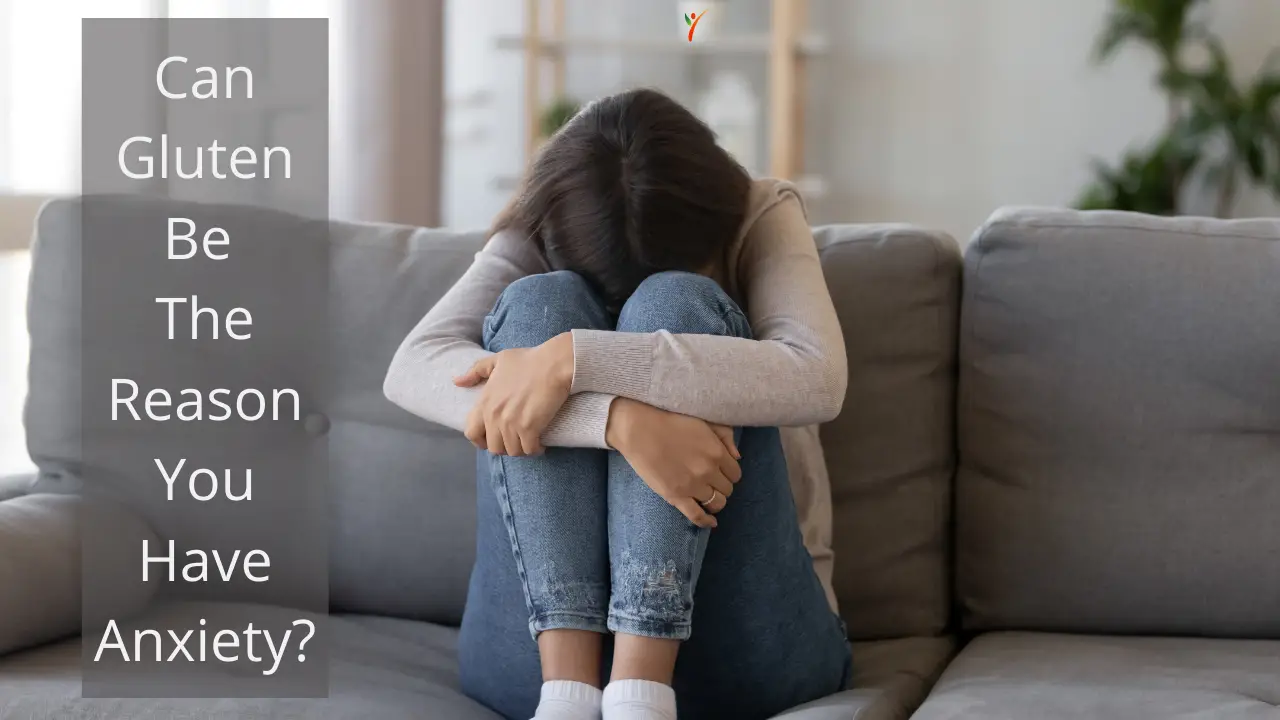Do you or a loved one ever face an extreme bout of stress and anxiety? Have you been able to figure out what exactly triggers your anxiety? Could it be due to your eating regime?
You probably have noticed more people eating a gluten-free diet. And recently, researches have been conducted to find the relationship between gluten and anxiety. But does gluten cause anxiety? Gluten and health issues are a trendy, researched topic.
Let us explore the answer to this question. We will first need to understand the gluten and anxiety connection.
Gluten And Anxiety Disorder

Anxiety is quite a common indication both in celiac disease and in non-celiac gluten sensitivity.
- A lot of recently analyzed individuals report sentiments of both nervousness and discouragement.
- The celiac malady is an immune system condition that makes individuals have an insusceptible response in the small digestive tract when they eat gluten.
- It's not known whether gluten in the eating regimen causes anxiety. There are possibilities that the issue is something different.
- It's conceivable that inadequacies and ailing health may add to anxiety in individuals with the analyzed celiac malady.
- Be that as it may, individuals with gluten affectability do not experience the ill effects of this equivalent intestinal harm. But, some experience comparable or possibly much more elevated levels of stress and anxiety.
The consumption of gluten and having anxiety attacks is quite common amongst some.
But is that the root cause, and does gluten cause anxiety? A vast amount of research has tried to answer this question and establish a relation between gluten and stress.
Does Gluten Cause Anxiety?

There are two types of anxieties.
– State anxiety – is temporary and has an elevated autonomic nervous system response.
– Trait anxiety – Trait anxiety represents a reasonably stable characteristic related to personality. Experiencing more frequently state anxiety combined with a general view of the world as threatening and dangerous is a marker of trait anxiety.
Studies had recognized high levels of anxiety in individuals with celiac disease.
One examination indicated that both state anxiety and trait anxiety were visible in individuals who had quite recently learned they had celiac disease.
These discoveries state that anxiety in celiac patients is overwhelming. And this is a receptive structure instead of a character quality—the principal manifestations' presence, such as stomach uneasiness, loose bowels, and weight reduction.
- It is a known fact that gluten and mental health issues are related. But one must understand the gravity of their relation to knowing how exactly gluten triggers anxiety.
With the rampant increase in the use of gluten-free food, most people might suggest going gluten-free. But does a gluten-free diet reduce anxiety? A large number of studies establish the fact that our moods are related to a spectrum of gluten disorders. Adopting a gluten-free diet for depression and anxiety has proved to help a great deal in curing it.
What Do Researches Suggest?

How does gluten cause anxiety? Take a look at this study. In 1979, Christine Zioudrou, Ph.D., and her associates at the National Institute of Mental Health found that gluten contains polypeptides or protein pieces tied to morphine receptors.
- Similar receptors show that the polypeptides, along with narcotic medications, cause imbroglio. They named them “exorphins,” short for exogenous morphine-like mixes, recognizing them from the endorphins (additionally morphine-like exacerbates).
- These are those that we produce inside and happen, say, during a sprinter's high. These receptor destinations sway the level of joy and excitement we feel and change cerebrum science in light of the withdrawal impact. They can distinctly affect temperament.
- As indicated by William Davis, MD, Wheat Belly analysts estimate that exorphins may be the dynamic elements in wheat that caused the decay of anxious manifestations.
- Wheat, indeed, almost remains solitary as a portion of food with strong focal sensory system effects.
- Outside of intoxicants, for example, ethanol (like that in your preferred merlot or chardonnay), wheat is one of only a handful of food that can modify conduct, incite pleasurable impacts, and create a withdrawal disorder upon its expulsion.
How Does A Gluten-Free Diet Help With Anxiety?

Celiac disease influences 1% of individuals in the UK and the US. Individuals who are suffering from this ailment need to keep away from eating gluten.
While weariness and incessant loose bowels are very much an issue in these individuals, celiacs' mental outcomes are not frequently featured. Recent studies show that the mental health effects of celiac disease can be very alarming.
From a consistent viewpoint, individuals who can't eat gluten must be extra cautious when eating out. It can prompt a scope of sentiments from disappointment to feeling rejected. At evening gatherings, they might feel embarrassed due to declining a particular food. And generally speaking, the dietary limitations may force social constraints also.
Scientists have noticed that gluten-sensitive people find that deterrents to sans gluten diet consistency include:
– Inappropriately labeled foods
– Misguided judgments of or absence of information about gluten-free needs in the food and cooking industry
– Language boundaries when traveling
– Cross-contaminating
– Humiliation, social or peer pressures
People with extreme gluten intolerances frequently report manifestations of anxiety and depression when starting a gluten-free diet. It can be because of the side effects ascribed to an undiscovered or unfamiliar gluten-related condition.
With the presentation of a diet that does not involve gluten, diet consistency is related to pressure and anxiety. As in a recent report, 91% of gluten-sensitive people experience gluten consumption once every month. Over half of these people were unaware that they had consumed gluten until they encountered manifestations.
The carefulness needed to evade dangers; for example, cross-pollution can take a mental and emotional toll on a gluten-sensitive person's well-being. Numerous individuals abstain from ever eating out.
What Causes Anxiety In Celiac Patients?

In individuals with celiac disease, gluten causes intestinal dysbiosis, a condition wherein the gut microbes are out of equalization. Gut bacteria can indeed affect mindset — so much that our gut is some of the time named our second brain.
- In specific individuals, gluten could likewise disintegrate the gut lining when certain foods enter their circulatory system.
- This circulatory system, which is our safe framework, reacting to an assault by an unfamiliar item, sends an SOS message through our sensory system.
- It can create side effects of anxiety and discouragement.
- Fundamentally, gluten triggers irritation and the reaction to that aggravation can influence various organs and tissues, all of which sway our state of mind.
- A harmed intestinal divider likewise implies that we are not appropriately ingesting fundamental supplements. Those supplements are essential to mindset and include zinc, B vitamins, and vitamin D.
- Finally, if our digestion tracts are not healthy, that implies we're not producing as much serotonin. Because our gut nerve cells create 80 to 90 percent of serotonin, gluten could likewise restrict tryptophan creation, an amino corrosive that is the serotonin antecedent.
Many people who discontinued gluten in their eating regimen saw a considerable improvement in their mental health. But it did not occur immediately. It took up to nine months to notice all the benefits.
When you go gluten-free for a long time, you can easily experience the adverse effects of consuming gluten even once. Symptoms like uneasiness, brain fog, and tense feelings. Whether fact or fad, most people going gluten-free see a significant improvement in their anxiety.
How To Cope With Anxiety Caused By Gluten?

One of the most common complexities of gluten is tension and anxiety and can include depression.
Stomach irritability might be eased on a gluten-free diet but can be quite mentally torturous. Some adult patients who have celiac disease have encountered anxiety while eating gluten.
This impact might be especially conspicuous in female patients with the disease. The uneasiness from having diarrhea and their overall well-being is exacerbated by social prohibition and limitation. The eating routine does little to change the general mental condition of individuals who have celiac malady.
The issue with numerous anti-anxiety medications is that they also influence the gut, causing sickness and loose bowels. It can be very agitating to individuals who already have gut-related issues. In these cases, including or utilizing self-care to diminish uneasiness might be useful.
The following are mind-based intercessions for individuals who experience celiacs' ill effects and decrease their tension.
Decreasing Stress
When you have an ailment like celiac, eating gluten fires the neurons in your brain and your cerebrum, causing your stress to rise.
Additionally, when you eat sans gluten food, you have discovered an opportunity to live a healthy and happy life.
If you are invited to a function, make it clear to the host that you can not eat gluten-containing food. Discuss with them before the event so that they understand your gluten sensitivity. When they comprehend what you can eat, they will oblige you, leaving you less anxious.
Don't hyper-focus
When your mind goes to the ‘on edge zone,' understand that you have more authority over this than you might think. You may wish to keep a journal for a couple of months. It will assist with preparing your mind to focus on other things and keeping your head clear.
Feel at ease with your new lifestyle
Feel like holding a party of your own? Hold sans gluten parties without considering them that. Look into ideas on how to approach the issue with expertise. Serving gluten-free foods are relatively straightforward. Find recipes for appetizers and meals that don't require gluten in them.
Hence, the stress can bring about continuous uneasiness if you do not stop it from the beginning. These are three brief, however valuable intercessions you can use to help live a more mentally peaceful life.
Does Going Sans Gluten Help?

There is uplifting news if you have celiac disease: symptoms of anxiety appear to decay when you go sans gluten.
Numerous individuals report encountering resurgences of nervousness indications when they consume gluten, yet these manifestations appear to be brief for the most part.
The clinical investigations show that numerous individuals battle with elevated anxiety levels when they are eating sans gluten. Typically these are caused more by others, mainly when they live in a family unit imparted to individuals who eat gluten.
In case you encounter significant nervousness levels despite eating carefully and gluten-free, you should think about conversing with your doctor. They may suggest you see a therapist for treatment.
Other careful methodologies to adapt could be, chanting a mantra, shutting your eyes, and heading off to your happy place. Meditation can be a helpful stress reliever.
Final Words
Uneasiness should not be a consistent feeling you encounter. If you feel it is disrupting your everyday life, you need to find out the root cause. Gluten in food could be the culprit. Try going on a gluten-free diet and recording your thoughts and any feelings that arise.
When you figure out what is causing your anxiety, life will be more enjoyable and much less overwhelming.





